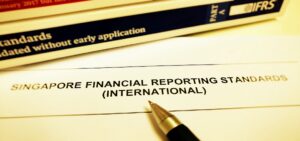Singapore Companies Filing Requirements
Every year, companies in Singapore need to file with two main governing bodies, namely the Accounting and Corporate Regulatory Authority (ACRA) and the Inland Revenue Authority of Singapore (IRAS). The Singapore companies filing requirements consist of three components.
Estimated Chargeable Income (ECI)
Companies are required to file the ECI or estimated taxable income within three months after the company’s financial year-end. This income is calculated as the gross amount before any deductions under the tax exemption scheme for new companies and partial tax exemption schemes.
IRAS has implemented an ECI waiver if a company fits either criterion, to help companies reduce compliance costs:
- The company’s annual revenue is below Singapore Dollars (SGD) $5 million of the financial year
- The company has zero ECI
Starting from YA 2020, all companies must e-file their ECI regardless of revenue.
You need to provide the following information for e-filing:
- The company’s tax reference number, also known as UEN or business registration number.
- The company authorised you as an ‘Approver’ for Corporate Tax (Filing and Applications) in CorpPass
- CorpPass ID and password
As announced in Budget 2020 on 18 February 2020, companies that file their ECI on time and already paying their taxes through GIRO will automatically qualify for two additional months of interest-free instalment. The ECI must be filed as follows:
- during the period from 19 February 2020 to 31 December 2020 (both dates inclusive); or
- before 19 February 2020 and the company has an ongoing instalment payment to be made in March 2020
Annual Return
Under Section 175 of the Companies Act, all companies are required to hold their Annual General Meeting (AGM) within 18 months from its date of incorporation, with subsequent AGMs held in each calendar year, and not more than 15 months from the previous AGM.
During AGM, executives from the company will present the company’s financial statements to shareholders, for them to get the latest update and understand the company’s financial position. For more information on how to hold an AGM for your company, click here.
All companies must prepare their financial statements according to the Singapore Financial Reporting Standards (SFRS), and include the following:
- Director’s Statement
- Statement of Financial Position
- Comprehensive Income Statement
- Statement of Changes in Equity
- Cash Flow Statement
- Notes to the Financial Statement
Companies that fit the criteria of a small company do not need to audit their financial statements. The penalty is an SGD $300 fine for failure to comply with Section 175 of the Companies Act.
Additionally, companies must file their Annual Return with ACRA no later than 30 days from the date of AGM under Section 197. The penalty for non-compliance with this Section will result in an SGD $300 fine.
Income Tax Return
Every year, IRAS will send either a Form C-S or Form C e-filing notification letter by the month of May. The due date for e-filings is by 15 December for YA 2020, and 30 November for YA 2021 onwards.
Form C-S is a simplified version, with fewer fields to fill as compared to Form C. Companies will be qualified to file using Form C-S if they meet the following criteria:
- Incorporated in Singapore
- Annual revenue of below $5 million
- Derives income taxable at the prevailing corporate tax rate of 17%
- Is not already claiming Group Relief, Investment Allowance, Foreign tax Credit and Carry-back of Current Year Capital Allowances/Losses
Companies that do not qualify to file Form C-S, must obviously file Form C. You need to submit the following documents together with Form C:
- Your company’s financial statements
- Tax computation
- Supporting schedules
In addition to enhancing the e-filing experience for small companies, if they qualify for Form C-S, and have annual revenue of SGD $200,000 or below, they have the added option of filing Form C-S (Lite). It is a simplified version of Form C-S with only six essential fields to fill out. This is more for companies with straightforward tax matters.
If you need help on your Singapore companies filing requirements, you can contact us here.
Download the Telegram app and follow us for the latest updates: https://t.me/sgcompanyservices
How To Incorporate A Social Enterprise
What is a Social Enterprise?
A social enterprise is just a business that has specific social objectives. A social enterprise’s aim is still profit-driven while giving back to society and the environment at large. The profits of social enterprises can primarily fund social programs, i.e. Yellow Ribbon, The Straits Times School Pocket Money Fund.
Think of social enterprises as a cross between a traditional profit maximising commercial business and a volunteer organisation. Social enterprises try to drive activities that will have financial profits, but with social goals in mind. Revenue is definitely essential in sustaining a social enterprise, however, making money is not their primary driving factor.
While social enterprises rely on revenue to sustain themselves, non-profit organisations or charities solely have to rely on external funding like donations to keep themselves running. That is the main difference between them.
In most cases, social enterprises are profitable. Reinvesting profits into their social cause is their priority, rather than paying out dividends to its shareholders.
Who is the Singapore Centre for Social Enterprise (raiSE)?
The Singapore Centre for Social Enterprise (raiSE) is the sector developer and membership body for aspiring social entrepreneurs. It also governs existing social enterprises and other individuals and organisations that are potentially interested in making contributions to the development of the Social Enterprise scene. raiSE raises awareness on social entrepreneurship and raise support for social enterprises in Singapore.
raiSE defines social enterprises as business entities set up with clear social goals; and where there are clear management intent and resources allocated to fulfil their social objectives.
There are grants that help companies focus on championing social causes, such as the VentureForGood (VFG) grant. It is a grant under raiSE to support social enterprises in various stages of their business. New and existing social enterprises that are starting up or expanding their operations can apply for up to $300,000 in grants. The raiSE Impact Finance Plus (RIF+) is an additional scheme that social enterprises can take up. Its primary aim is to achieve a demonstrable increase in the breadth and/or depth of social impact created via its funding.
If you are looking to start a social enterprise, do look for an experienced corporate secretarial firm like us to assist you with this matter.
When in doubt, seek legal advice or consult an experienced ACRA Filing Agent.
Download the Telegram app and follow us for the latest updates: https://t.me/sgcompanyservices
How Do You Convene An Extraordinary General Meeting (EGM) For Your Company
What is an Extraordinary General Meeting (EGM)?
If you have incorporated a company in Singapore or planning to do so, chances are you have done or heard of Annual General Meetings (AGMs). As an exempt private company limited by shares, it is mandatory for you to convene an AGM annually within 6 months after your company’s financial year-end. But what is an Extraordinary General Meeting (EGM) and its purpose?
An EGM is necessary for shareholders' to collectively approve important business decisions and matters. Especially so when some business decisions need to be approved before the next AGM can happen, or it might be detrimental to the business if the decision is delayed.
The agendas of EGMs can be anything ranging from the amendment of the company’s constitution, the election of new board members or issuance of new shares, and so on.
How to convene an EGM?
The directors and shareholders of a company can call for an EGM. Shareholders can call for an EGM under 2 options:
- Any shareholders with a minimum of ten per cent (10%) of total voting shares can get the board of directors to convene an EGM; or
- Two (2) or more shareholders holding at least ten per cent (10%) of the total number of shares issued
Singapore courts of law have the rightful authority to convene an EGM, where it is impossible to conduct a meeting in the usual manner. Some of these scenarios are:
- Quorum requirements are not met;
- An impasse in business decisions has occurred
A quorum is the minimum number of shareholders that must be present during the meeting, who are entitled to vote. The quorum for EGMs is usually specified in the company’s constitution. If the quorum is not specified in the company’s constitution, the mandated minimum number of members that must be present is two (2), as stipulated in section 179(1)(a) of the Companies Act.
Notification of an EGM
The company needs to give notice, in writing, of the EGM to the shareholders, in order for the EGM to be valid.
Fourteen (14) days is the minimum notice period for all meetings, AGMs and EGMs, for private companies. The same notice period is required for public companies for ordinary resolutions. However, for special resolutions, a twenty-one (21) day notice period is necessary.
A shorter notice period is possible if the majority of shareholders who hold at least ninety-five per cent (95%) of total voting rights agree.
The crucial information of the business matter to be discussed during the EGM must be provided to all parties involved. The date, time, and location of the EGM must be stated clearly in the notice. The agenda of EGM must be stated in the notice as well.
The notices can be sent by registered mail. Besides that, emails and notifications on the company’s website would suffice as well. You will have to check your company’s constitution if the use of electronic transmissions is permitted.
What happens after the EGM?
At the end of the EGM, there will be a voting outcome on the resolutions whether they have been passed or rejected. There are certain steps to take after the EGM to ensure the resolutions passed are official.
For example, if a company passes a special resolution at the EGM for voluntary winding up, a copy of the special resolution has to be lodged with the Accounting and Corporate Regulatory Authority (ACRA) in 7 days. The company must take up a publication in at least one Singapore newspaper within ten (10) days of the same resolution. After which the board of directors can appoint a liquidator to start on the voluntary winding-up proceedings.
In the course of your business, there will definitely be a time whereby you need to convene an EGM to get your shareholders to decide on the company’s matters. Therefore, it is important to keep in mind the procedures of calling for an EGM.
It may seem very confusing and cumbersome to call for an Extraordinary General Meeting. At the same time, to fulfil all the various legal requirements. If you need help or have any questions on the process of convening an EGM, you should always engage a corporate secretary to help you.
If you have any questions for us regarding how to convene an EGM, do not hesitate to contact us.
Download the Telegram app and follow us for the latest updates: https://t.me/sgcompanyservices
Can Directors And Shareholders Obtain A Loan From The Company?
A director or shareholder may obtain a loan from the company, but not without certain restrictions. In general, a director cannot do so. But there are circumstances that a director or shareholder may do so if there is compliance with certain rules, to ensure corporate governance is in place.
Directors (and Related Persons) obtaining loans from Company
There can be a variety of reasons why a director may need to obtain a loan from his or her company. One common reason is that the director requires funding to carry out businesses on behalf of the company.
Restrictions on loans
As mentioned, the general rule is a company cannot make any loans to its director, or a director of related companies. Related companies refer to companies belonging to the same group i.e. holding or subsidiary companies.
The rule covers not only standard loan agreements but all credit transactions, guarantees, and quasi-loans made for the benefit of a relevant director.
A quasi-loan is whereby the company agrees to pay a debt incurred by a director or a director of a related company, based on the agreement that he or she will repay the company.
Credit transactions are where the company would do one of the following:
- disposal of immovable property or supply goods under the hire-purchase structure or conditional sale agreement
- lease or hire goods or immovable property in exchange for a periodic payment, or
- disposal of immovable property, goods or services based on understanding that payment will be deferred
Guarantees refer to the company providing security for a loan, quasi-loan, or credit transaction made by a director, for the benefit of a director.
Related persons under the Companies Act (CA)
The restrictions on obtaining loans from a company by directors apply to the directors’ related persons as well. The CA defines two types of related persons.
- The director’s family members, including the spouse, children (adopted as well), and step-children. They are generally cannot obtain any loans from the director’s company
- When the lending company is not an exempt private company, and the director has twenty per cent (20%) voting rights or more in the company or limited liability partnership (LLP) that takes up the loan. An exempt private company has no more than 20 shareholders and no companies have a beneficial interest in the shares.
In this situation, the borrowing company or LLP is a related person. Any loans between the entities need prior approval in a general meeting from the company that is lending. The director that is borrowing, and all his family members, will have to abstain from voting on the matter.
To determine whether a director has sufficient interest in the company that is obtaining the loan to trigger restrictions in the CA, the interests of the director’s family members are one and the same as the director’s interests. What this means essentially is that even if the director doesn’t have a twenty per cent (20%) or more voting interest in the company that is obtaining the loan, prior approval is still necessary if the family members have a cumulative interest.
Exceptions
Loans made to a director is possible under some exceptions.
- For the purpose of an expenditure, a director has incurred for the course of business, or to fulfil his duties as a director.
- The loan is for the purpose of purchase or leasing a home for the director to live in, where he or she is a full-time employee of the company or related company. There must not be more than one such outstanding transaction.
- The loan is given as a scheme to benefit employees, whereby the director is a full-time employee of the company or related company, and the scheme has been approved prior to a general meeting.
- If the company is in the business of lending money, and the loan is given to the director as an ordinary course of business. However, the company’s activities must be regulated by the Monetary Authority of Singapore (MAS), and laws related to banking and finance.
Additionally, lending companies that are exempt private companies can provide loans to the borrowing company, even when the director of the lending company has twenty per cent (20%) or more voting interest in the company that is obtaining the loan.
How to obtain approval for the loan
When the loan falls under any of the first two exceptions stated, it must obtain approval from the company during a general meeting. The purpose and amount must be fully disclosed.
If the loan has been made without obtaining approval at or before the next Annual General Meeting (AGM), the loan amount must be repaid within six (6) months from the conclusion of AGM. All directors who authorised the loan shall be jointly and severally liable for any losses arising from the loan made, indemnifying the company.
Loans involving a company where the director has at least twenty per cent (20%) voting interest, will be permitted so long as approval is given in a general meeting. However, the concerning director and his or her family members have to abstain from voting.
Penalty for breaching restrictions
Any director who authorises the loan in breach of allowed exceptions and the requirements of approval shall be guilty of an offence. He or she will be liable for a fine of up to Singapore Dollars (SGD) $20,000 or imprisonment of up to two (2) years.
Interests and taxes
The law does not provide for any interests payable for the loan by a company to its directors or related persons. As such, loans can be interest-free or subsidised. Having said that, taxes may apply to these loans. Under the income tax law, directors are employees of the company. Therefore, any benefits that are derived from the company loan, is an employment benefit since the loan was obtained in the director’s capacity. Interest benefits will be taxed underemployment benefits.
The value of interest benefit is determined by multiplying the average prime lending rate for that particular year, by the outstanding loan as of 31 December of the same year. If the director is also a shareholder, the loan given to the director in the capacity as a shareholder (rather than in the capacity of a director), the interest benefits will not be taxable as they are not employment benefits.
How a loan is determined to be obtained in a shareholder’s or director’s capacity, depends on the facts during which the loan is obtained. Some of these are:
- Sufficient non-tax reasons for it to be given as a loan rather than dividends.
- A repayment schedule in the form of a loan agreement and reasonable evidence that the loan will be repaid.
- Presence of loans offered to other members of similar amounts and terms.
- Documentary evidence such as minutes of meetings, directors’ resolutions
Directors’ duties and interests disclosure
Directors are bound by a statutory duty to disclose any direct or indirect interests that they have, in any transactions with the company, including loans obtained from the company by the director or related persons. It must be disclosed at a directors’ meeting. A notice must be sent to the company on the nature and extent of this interest. The director has to take reasonable steps as soon as he or she is aware of this interest.
When a director obtains a loan from the company, he or she must genuinely believe that it will not cause significant harm to the company. Because directors have a duty to act in an honest manner and be diligent in their duties. They must not abuse their position and knowledge obtained by reason of their positions in the company to obtain benefits for themselves or others, or cause harm to the company.
If a director is guilty of breaching his statutory duty, he or she will be liable for any profit made or loss suffered by the company. He or she also faces a fine of up to SGD $5,000 or imprisonment of up to twelve (12) months.
Shareholders obtaining loans from Company
There are no legal implications regarding a shareholder obtaining a loan from the company, due to the fact that a shareholder does not share the same duties and responsibilities to the company, as compared to a director. It is for the board of directors to decide to proceed with the loan or not. The directors have to act according to their duties as a director as mentioned above.
Company obtaining loans from Directors and Shareholders
Companies wanting to obtain a loan from directors and shareholders are fairly common especially in the early stages of companies. The process is fairly straightforward, unlike the vice versa scenario. The loan agreements need not contain comprehensive representations made by the borrower to the lender. Approval needs only to be given by the board of directors.
The reason why such agreements can be simpler is that as a shareholder or director of the company, he or she is fully aware of the company’s financial situation. He or she will be in a good position to know about it.
Under the Companies Act, they have access to the company’s financial statements. So extensive representations from the company to obtain a loan from its shareholders and directors are unnecessary. Any loans given by the members or directors can be interest-free as well.
If you are unsure as to how you can obtain a loan from your own company, feel free to contact us.
Download the Telegram app and follow us for the latest updates: https://t.me/sgcompanyservices
Are You Liable For Company Debts As Director In Singapore?
Are there any circumstances where you will be personally liable for your company’s debts as a director? The general answer will be no.
That is the sole purpose of why you should incorporate an exempt private company limited by shares. The Singapore courts are not willing to allow creditors to go after the directors in a personal capacity. This is in the spirit of creating a pro-business environment in Singapore for enterprising individuals to start businesses.
If every individual is legally liable for their company’s debts, few will be willing to start their own businesses.
However, there are some exceptions to this general rule of thumb. We discuss them below.
Scenarios where Directors will be liable
-
If you are the guarantor or co-borrower
If you take out a credit facility for your company as a guarantor, the creditor will be able to sue you in a personal capacity in event of a default. Even though you and your company are two separate legal persons, both of you will be jointly liable for the debt if you jointly sign on a credit facility agreement.
-
Creditors apply to the court to hold the director(s)/shareholder(s) personally liable
The second scenario is whereby a creditor applies to the court to ‘lift the corporate veil’. This is a technical legal concept. A ‘veil’ is cast over the controllers of the company, thus separating the company and the controllers as two separate legal entities. Once the corporate ‘veil’ is lifted, it means the controlling director or shareholder will be liable for the company’s debts. Chances of succeeding are slim and it can only happen in certain circumstances. The creditor has to show either:
- You have abused the limited liability protection the company’s corporate form has provided at the creditor’s expense
- The court will require proof that you have abused your company, using it as a vessel to commit fraud or sham transaction whether dishonestly or maliciously, by withdrawing all company’s funds including the fraudulently obtained funds. In such cases, the creditor has no legal recourse as the company has no more funds for the creditor to claim from.
- You have treated the company’s assets as your own
- This is a fairly straightforward scenario. You treat the company’s bank account as your personal bank account, withdrawing funds from it without a board resolution authorisation. Or you make claims to the receivables of the company.
- You have abused the limited liability protection the company’s corporate form has provided at the creditor’s expense
-
In breach of the Companies Act
There are certain statutory provisions that state under certain circumstances, a director or shareholder will be liable for the company’s debts. Section 145(10) of the Companies Act states that if the company has operated for six (6) months or more without a Singapore resident director, any shareholders who come to be aware of this matter can also become liable for any company’s debts incurred after the 6-month period. Additionally, section 144(2) of the Companies Act states that a shareholder or director who signs a promissory note, bill of exchange, or any other negotiable instruments on behalf of the company where its name is not mentioned on the document, will potentially be liable for payment obligations of that particular agreement if the company does not make any payments.
If you are personally liable for the company’s debts, what should you do?
You should immediately engage a litigator to defend the suit if a creditor sues you personally for your company’s debts. It will be difficult to apply to ‘lift the corporate veil’ and impossible to predict the outcome of the suit.
Engaging a lawyer can potentially help to defeat the claim, or buy you time and give some leverage to negotiate for a settlement.
The creditors may engage debt collectors who may start harassing you at home, you may consider applying for a protection order through your lawyer, and seek damages for harassment from them.
Paying the Company debts if you lose the lawsuit against Creditors
In the event that you lose the lawsuit, you will have to pay the company’s debts and you should. If you are unable to repay, the creditors can apply to enforce the judgment against you. This is a serious matter as your personal belongings can be seized and sold.
Your next alternative move is to file for bankruptcy. Once your bankruptcy order is official, all creditors will be unable to take further legal proceedings to recover the debts. Instead of paying the full amount of the debts, you can pay by instalments over a few years instead.
Nevertheless, being bankrupt has very serious repercussions. One of the things that you cannot do, is to travel out of Singapore or hold any directorships in any company.
While as a general rule, directors will not be liable personally for their Singapore registered companies. However, there can be situations whereby the directors can be liable. If you are sitting on board as a company director and a creditor is suing you personally for your company’s debts, you should seek to engage a lawyer without delay. They will be the best persons to advise you on your next course of action.
If you are unsure of what your obligations are as a director, feel free to contact us for advice.
Download the Telegram app and follow us for the latest updates: https://t.me/sgcompanyservices
Advantages Of A Private Limited Company In Singapore
There are various structures for every individual to start a business here in Singapore. The best structure to start a company here in Singapore is a Private Limited Company (Pte Ltd) or the equivalent of a Private Company Limited by Shares. There are obvious reasons why we recommend this company structure. They are as follows:
Limited liability for the company (beneficial) owners
A Private Limited Company (Pte Ltd) is a separate and different entity from its owners. A company has the capacity to form business dealings and bind legal contracts with other individuals and/or companies. It can be liable for all the contracts that it has entered into. Just think of incorporating a company as a mother giving birth to another baby, the mother and the baby are two separate legal persons. As such, the company and its shareholders are two separate entities. The shareholders' liability is limited to the issued and additional paid-up capital in the company.
This does not mean the same for the directors of the company. Directors can be responsible for their actions if there is any criminal conduct.
Taxation advantages
New companies can take full advantage of the government’s tax exemption scheme introduced in Year of Assessment (YA) 2005. Under this scheme, newly formed companies have a full exemption on the first $100,000 of chargeable income. For the next $200,000, there is a 50% exemption from taxes. It is applicable to the first three years of assessment. Basically, it means that newly formed companies earning less than $100,000 for the first three years of assessment, need not pay any corporate tax totally. But do take note that this tax exemption does not apply to some company structures, such as an investment holding company, or a company with developing properties for sale, investment, or both, as its principal activity.
The company must fulfil these 3 conditions to qualify for tax exemption.
- Incorporated in Singapore (but of course!)
- It has to be a tax resident in Singapore for that financial year
- The company must not have more than 20 shareholders throughout the basis period for that financial year. Whereby all the shareholders are individuals “beneficially and directly” holding the shares in their own names, or at least one shareholder is an individual “beneficially and directly” holding at least 10% of the issued ordinary shares of the company.
Tax-friendly business environment
All companies enjoy the Corporate Income Tax (CIT) rebates to help them deal with rising business costs. The CIT rebate is set at 25%, capped at $15,000 for the year of assessment 2020. The Singapore government has been consistently giving CIT rebates. The sole reason is to remain competitive. The Singapore government has always been adopting a pro-business mindset to remain competitive in this global economy. This is what attracts foreign investments into Singapore, foreign companies starting their bases here will inevitably create more jobs for Singaporeans.
Please take note that only revenue expenses incurred after your business has commenced will be eligible for tax purpose deductions. The Singapore government has given a concession, whereby revenue expenses incurred one year before the first day of the financial year, in which you earn your first dollar of business receipt will be tax-deductible.
Government grants
There are many government grants to help companies grow. A large portion of the government’s budget annually is set aside for the various grants. Available grants such as Enterprise Development Grant (EDG) by Enterprise Singapore, Productivity Solutions Grant (PSG), or the Market Readiness Assistance (MRA) grant are a few popular grants available amongst other types of grants.
Incorporating a Private Limited Company in Singapore is extremely affordable. But the process can be confusing to some, so you should always engage a qualified ACRA filing agent to help you incorporate your company.
If you have any questions, you can contact us here.
Download the Telegram app and follow us for the latest updates: https://t.me/sgcompanyservices
How To Issue Shares In A Singapore Private Company
The issuing of new shares is one way to secure capital for your business in a Singapore incorporated private company.
Things to consider before issuing shares
- Types of shares
There are ordinary shares, preference shares, shares with special voting rights, management shares, or even alphabet shares.
(a) Ordinary shares
Ordinary shares have equal voting rights. This is also the most common type of shares issued by a company. Their entitled dividend rights are in accordance with their shareholding proportions. Ordinary shares can further be divided into what we call alphabet shares which can further segregate different classes of shares with different rights that come with it (e.g. Class A/B/C)
(b) Shares with different types of rights
There is a wide variety of shares. Preferential shares which have preferential dividend rights. Shares that have no voting rights or shares that have more voting rights. Management shares have special rights as well, for example, to appoint a board member. - Shareholders approval
The issuing of shares is normally done through a director’s resolution. The shareholder(s) will have to give their approval to the board, for the issuance of new shares as per section 161 of the Companies Act.
The board must have either:
(a) specific approval for that particular allotment of shares; or
(b) A general approval through the form of a general meeting, giving approval to the Board of Directors to issue shares
There may be a need to hold an Extraordinary General Meeting (EGM) to get approval from the existing shareholders before issuing any new shares. You may need to refer to your company’s constitution if there are any specific procedures that you may need to perform before the company can issue any new shares.
How can I issue new shares?

Alternatively known as allotment of shares, whereby your company’s new shareholders subscribe to the company’s constitution.
Your corporate secretary will prepare the following documents for you:
- A Director’s Resolution in Writing documenting down the issuance of the shares;
- Lodging with Accounting and Corporate Regulatory Authority (ACRA) within 14 days a return of allotment and
- New share certificate(s)
The following information should be in the return of the allotment:
- Total number of shares in the allotment;
- Break down of amount paid or deemed paid or unpaid on the allotment of each share;
- In the event, there are different classes of shares, the specific class of shares to which each share belongs to in the allotment and
- The full legal name, identification, nationality, address of, and the amount and class of shares held by each shareholder of the company. If there are more than 50 members, such particulars of each of the 50 members who hold the most shares in the company after allotment.
After the allotment of shares, your company must issue the share certificates to new shareholders within 60 days. Your corporate secretary must update the register of members after the issuing of share certificates to new shareholders.
Is there a need to issue a prospectus?

Any offers of securities in the form of shares or bonds or other derivative products, a prospectus has to come together with it. This is pursuant to section 240 of the Securities and Futures Act (SFA).
You can avoid having to issue a prospectus, which can be very costly and time-consuming. You can instead utilise a private placement exception pursuant to section 272B of the SFA if you fulfil certain conditions. The conditions are to make the offer of investment to not more than 50 persons within any 12 months period, and not to have any advertisements or promotional expenses.
Your company must document the shares' details, their rights and obligations in the company constitution or shareholder’s agreement, In the event of any legal disputes, all aggrieved parties can refer to the shareholder’s agreement or constitution.
If you have any questions regarding how to issue new shares in your company, feel free to contact us.
Download the Telegram app and follow us for the latest updates: https://t.me/sgcompanyservices
Holding Annual General Meetings (AGMs) For Your Company
What is an Annual General Meeting (AGM)?

Annual General Meetings (AGMs) are compulsory annual meetings that all Singapore companies need to hold. The primary purpose is to update the shareholders of the company on the business or financial health. Financial statements are presented to the shareholders and they can raise any questions that they may have on the company’s performance to the board of directors.
The shareholders vote on important business decisions as well, for example, to remove an existing director or to appoint a new director.
*Note: This article applies to companies that their financial year-end (FYE) ends on 31 August 2018 and beyond.
Deadlines for a company to hold its AGM

Unless exempted, private companies must hold their Annual General Meetings within six (6) months after their FYE. For public companies will be within four (4) months after FYE.
For companies incorporated before 31 August 2018, the FYE date is assumed as the anniversary of the FYE date notified to Registrar previously, if not, the FYE date will be assumed to be the anniversary of the company’s incorporation date.
Matters of discussion during AGM
Most of the time, your corporate secretarial service firm will prepare all the documents needed for you to hold your AGM. One such document is the company’s constitution. Profit and loss account (P&L) will be presented during AGM for the financial year as well. Examples of other matters to be discussed will be the re-appointment of directors and auditors, dividend declaration, director fees. Shareholders may raise any questions that they have as well for the board of directors.
Notice of AGM

A written notice indicating the date, time, and venue of AGM, the agenda and matters to be discussed, shareholder’s right to appoint a proxy, has to be given and circulated to the members at least 14 days prior. A copy of the director’s and auditor’s report, financial statements, the balance sheet should be prepared and sent to the members before the AGM.
Exemptions from AGM
If private companies send their financial statements to their members within five (5) months from the company’s FYE, they may be exempted from holding Annual General Meetings. Dormant private companies are exempted from holding Annual General Meetings as well as exempted from preparing financial statements.
An exemption is subjected to the following conditions:
- Shareholders can notify the company and request for AGM to be held. Notice is to be given to the company after its FYE, within fourteen (14) days, by the end of the sixth (6th) month.
- The company can request a time extension from the Accounting and Corporate Regulatory Authority (ACRA), subject to approval. The AGM must be held within six (6) months after FYE according to the shareholder’s request.
- If any of the shareholders or auditors request for reporting of the financial statements, an AGM must be held no later than fourteen (14) days after sending out the financial statements.
Dispensing with holding an AGM
A private company may dispense with holding an AGM by way of a resolution under section 175A of the Companies Act. Provided that the resolution has been passed by all shareholders of the company, whether in person or through their proxies.
There are still obligations to be fulfilled after doing away with the need for an AGM:
- Financial statements to be prepared at each FYE
- Financial statements and other company reports such as Director’s report to be sent to all shareholders
- AGM-related resolutions that are passed to be circulated
Do note that a shareholder may still be able to request for AGM to be held, so long as such a request is made within 14 days, before the sixth (6th) month dateline from the FYE. If there are at least three (3) months left to the AGM deadline, and such resolution has ceased its effect, an AGM must still be held.
Appointing a proxy for AGM

A proxy form has to be accompanied by the notice of AGM as mentioned earlier. In such an event that a shareholder is unable to turn up for an AGM, he or she may appoint a proxy to attend the AGM on his or her behalf, according to section 181 of the Companies Act. A maximum of two (2) proxies may be appointed to attend the same AGM. The proxy can be anyone so long as he or she is appointed by the shareholder, and he or she does not have to be a shareholder of the company.
Failure to meet the AGM deadline
As mentioned earlier, it is possible for companies to apply to ACRA for a time extension before the deadline, subject to ACRA’s approval. It can be done by any of the company’s officers such as the director or the corporate secretary. For public companies, they will have to provide reasons for the time extension request, with supporting documents and comments from SGX for the application.
The time needed for approval of an extension of time is generally up to fourteen (14) days and may take up to thirty (30) days if more clarifications are needed.
One such reason is a change in the company’s FYE date. It is necessary that you apply for the change in FYE date first, before applying for a time extension of AGM. If you are unsure about the steps, you may contact us or your corporate secretary to advise you further.
Post AGM
The AGM meeting minutes must be in writing and signed by the chairman of that meeting. After that, the company will file its Annual Returns.
The company will be required to verify the following upon filing of Annual Returns:
- Company’s name and registration number
- Registered address
- Principal activities
- Company type i.e. private or public listed company
- Summary of issued and paid-up share capital
- Registered charges
- Information of directors, company secretary, auditors, and shareholders
- The financial period which audited accounts are made up to
- Accounts in XBRL format
Penalties for the failure to hold an AGM
ACRA will impose penalties for non-compliance. Companies and every director may be given a chance to compound the offence by paying a composition sum of Singapore Dollars $300 per breach. Late lodgement fee shall be imposed as well for each return that is filed late.
ACRA may prosecute the company’s directors in Singapore Courts for failure to register and attend the Directors Compliance Program (DCP) offer by ACRA to first-time offenders. Failure to compound the offence when given a chance to will also lead to prosecution by ACRA, or in more serious cases, ACRA may not be willing to such offenders compound the offence.
A 3-tier composition fine for failure to hold an AGM is as such:
Tier 1: ACRA has the discretion to offer a composition fine of Singapore Dollars (SGD) $300 per breach before a summon is issued.
Tier 2: ACRA has the discretion to offer a composition fine of SGD $600 per breach after the summons is issued.
Tier 3: After a Warrant of Arrest is issued, ACRA has the discretion to offer a composition fine of SGD $900 per breach.
You may contact us if you have any questions or require assistance in preparing for AGMs.
Download the Telegram app and follow us for the latest updates: https://t.me/sgcompanyservices
Up To S$10,000 Assistance Grant For SMEs Hiring Singaporean PMETs
If your company is classified as a small and medium enterprise (SME) and you are looking to hire a Singaporean PMET (professionals, managers, executives and technicians), there is an assistance grant that your company may be eligible for.

Known as P-Max, this train and hire program is targeted at SMEs who are looking to hire more PMETs into their organisation. At the same time, P-Max also trains the potential employee to be better equipped to be working in an SME environment while empowering the SMEs to better train and manage their PMET workforce.
Depending on the needs of the company, there are 3 options available in this program:
- P-Max
- SMEs hiring PMETs
- P-Max for Older Workers
- SMEs hiring PMETs aged 50 and above
- P-Max Lite
- Non-hiring SMEs
Benefits of P-Max

In order to take part in P-Max, companies need to do so via a panel of program managers, who will help match suitable PMETs to the job openings. There will be a compulsory course to attend whereby companies can get up to 90% subsidy. Upon completing the program and successfully keeping the PMET hired for the next 6 months, your company will be eligible for an assistance grant of either S$5000 (P-Max) or S$10000 (P-Max for older workers).
This is a one time grant given regardless of the number of PMETs hired.
Requirements of P-Max

The newly hired PMET and the company's supervisor will be required to attend and complete the following courses:
- 2/3 Day PMET Workshop
- This is to help the PMET better adjust to working in an SME environment
- 1 Day SME Workshop
- This is to help the company better manage the newly hired PMET
- 1 Day Age Management Workshop
- This workshop is for companies hiring under P-Max for older workers. Again, this workshop primary purpose is to get companies to better understand how to manage and communicate with older PMET workers.
Eligibility Criteria For P-Max

For the SME, they must be:
- registered or incorporated in Singapore
- employment size of not more than 200 or annual sales not more than S$100 million
- minimum 30% shareholding by a Singapore citizen or Singapore permanent resident
- hired a PMET within the last 90 days with a gross salary of at least S$2500 per month
For the PMET, they must:
- Be a Singapore citizen or Singapore permanent resident (only Singapore citizen for P-Max for older workers)
- Education qualified at diploma level and higher or have prior experience working as PMET
- Have graduated or completed National Service for at least 12 months
How To Apply For P-Max

If you are keen to find out more about enrolling on this hiring program, you may contact the following program managers for more information:
- Association of Small and Medium Enterprises (ASME)
- Singapore Manufacturing Federation (SMF)
- Singapore National Employers Federation (SNEF)
- Workforce Advancement Federation (WAF)
Would you like to find out more about what other grants you can utilise for your company? Come talk to us today!
Download the Telegram app and follow us for the latest updates: https://t.me/sgcompanyservices
A Complete Compliance Guide For Singapore Companies
Are you thinking of starting a new company in Singapore? Do you have plans to make Singapore your company's base? There are many tax benefits as well as other advantages incorporating a Singapore company, however, you also face an increment in compliance requirements. The purpose of this article is to give you a complete compliance guide on starting a Singapore company, under Singapore's jurisdiction.
-
Registered office address

All companies incorporated in Singapore must have a registered office address so that all government official notices and letters can be sent. It must be an actual physical place that is located in Singapore. It should be open to the public during business hours, on every business day, for three (3) hours minimum.
Of course, foreign clients who are unable to travel frequently over to Singapore, have the option of using a virtual office service instead. They provide a legitimate Singapore business address and mail forwarding services for a recurring monthly fee. This is a much more affordable option as opposed to buying a physical property in Singapore.
You may click here for more advice or information if you have plans to rent or purchase a commercial property in Singapore.
-
Minimum 1 Singapore resident director

In every Singapore company, there has to be at least one (1) director who is a resident of Singapore. Note here that this does not mean that the person has to be a Singapore citizen. He or she can be a foreigner with a valid work or employment pass. He or she must be:
- A natural person (a company cannot be a director)
- A minimum of 18 years old
- In full legal mental capacity to act and make decisions (Anyone who has an impairment of brain and mind is considered unfit to act as a director)
An undischarged bankrupt cannot be appointed as a director. There are also some instances where the person will be automatically disqualified, such as:
- Convicted in Singapore courts, of offences involving fraud punishable with imprisonment for 3 months or more
- Failure to comply with the statutory requirements of the Companies Act in relation to the filing of returns, accounting and documentations with the Accounting and Corporate Regulatory Authority (ACRA)
- He or she is sitting on board of at least three (3) defunct companies which are struck off the register within a five (5) year period.
What we propose to newly incorporated companies is to engage a Nominee Director.
-
Company secretary

There must be one (1) company secretary to ensure that the Singapore company complies with all regulatory and reporting requirements with the Singapore authority. The position of a company secretary cannot be vacant for more than six (6) months at any one time. As the director, the company secretary must be a resident of Singapore. The director can also take on the position of company secretary so long as he is not a sole director.
-
Data protection officer

It is a statutory requirement for all Singapore companies to appoint a Data Protection Officer, this is to ensure that the company is in compliance with the Personal Data Protection Act.
-
Display of company name and Unique Entity Number (UEN)

ACRA will issue newly incorporated companies with a UEN. This number serves as an identification number that will be used in many instances with government authorities such as tax filing. It is also a requirement to display the company name and UEN on company documents. Examples of such documents are:
- Official company or business letters
- Invoices
- Statements of account
- Official notices
- Receipts
- Letters of credit
- Any official publications
Do note that the list is non-exhaustive. If there is a company seal, the company name and UEN must be displayed on it as well.
Any persons that are authorised to use the company seal on behalf of the company, sign on any official documents, without the company’s name, will be committing an offence.
-
Company registers

Maintenance of company registers is a requirement to improve accountability in business operations. The main registers are the register of shareholders, the register of directors, the register of secretaries and the register of controllers. You can read up more on the new requirement of maintaining a register of controllers that are mandated by ACRA for all Singapore companies here.
-
Complying with Singapore accounting standards

Deciding on financial year-end (FYE)
During the time of incorporation, the company must decide on the date of its financial year-end, which is also the date of the end of that company’s annual accounting period. It does not necessarily have to fall on any specific date or specifically the last day of the year. The business cycle is one important consideration for determining the date for FYE. This is so because it may be more accurate to get a complete full overview of the company’s financial position for the entire year.
Proper accounting records
All Singapore companies need to maintain financial records for at least five (5) financial years. Keeping proper financial accounts, and transaction records are important when the need to report to the authorities arises. These transaction volumes may be huge, so we strongly recommend you to engage the services of accredited bookkeeping and accounting firm to help you in ensuring compliance with the accounting standards and Inland Revenue Authority of Singapore (IRAS).
Appointing of auditor
Under the Companies Act, a company qualifies as a small company if it is a private company for the present financial year. It must also fulfil 2 out of the 3 requirements stated below for the last 2 consecutive financial years:
- The company’s revenue is not more than Singapore Dollars (SGD) $10 million per financial year
- The company’s total assets are not more than SGD $10 million in value at the end of each financial year
- Not more than 50 employees at the end of each financial year
The company needs to appoint an auditor within three (3) months of incorporation if it does not fall under the category of small companies. Failure to comply will result in a fine of up to SGD $5,000.00 or a jail term of up to twelve (12) months for the company and every person, on top of the original penalty imposed.
-
Filing of annual returns

The filing of annual returns is required for all Singapore companies. They can do so with ACRA through the government portal BizFile+. It must include financial statements, balance sheets, any changes in equity, and cash flow statements.
-
Annual AGM
All Singapore companies must hold their AGM within four (4) or six (6) months, depending on whether they are public or private companies. You can read more details on holding AGMs here.
-
Annual corporate tax

Singapore companies need to pay corporate tax on all forms of income regardless they are from Singapore or overseas.
There are two different deadlines depending on the mode that you will be using:
- If you are filing online, the deadline is 15 December
- If you are filing it physically, the deadline will be 30 November
-
Goods and Services Tax (GST) registration

Under the law, all companies will have to register their companies under GST with IRAS if the annual taxable turnover is more than SGD $1 million (S$1,000,000). You can do it yourself via myTax Portal on IRAS website, alternatively, you can always engage a trained professional to do it for you. The processing time is typically 2 working days. Once done and approved, the company will have to start charging GST on all applicable goods and services at the prevailing rate.
-
Compliance with employment regulations
Under the Employment Act, Singapore companies must comply with the regulations when it comes to hiring or laying off employees. The company must make contributions to the employee’s Central Provident Fund (CPF) account if the employees are Singaporeans or Permanent Residents. The appropriate CPF contribution rate will depend on the ages of the employees.
-
Compliance with disclosure requirements
Directors of Singapore companies need to comply with the statutes of the Companies Act. He or she must disclose any direct or indirect interests, on the transactions or potential transactions with the company. The director must also declare if there is any conflict of interest with his or her directorship in the company. An example would be if he or she owns shares of a competitor company.
Abuse of power by directors is not uncommon even in Singapore but this is a criminal offence. Failure to make the disclosure will possibly get you a fine of SGD $5,000 or a jail term of up to twelve (12) months.
-
Proper licensing and approval for conducting business

Singapore government regulates certain industries through its agencies, thus your company may need certain licenses or approvals before commencing operations. Some examples include restaurants or import of fruits and vegetables.
There will be certain requirements that need fulfilling before you can obtain the license. You can find out more from the government portal here.
The process is already streamlined and combined into one platform which is user friendly.
Hopefully, the above guide has been informative in guiding you to incorporate a company in Singapore. A corporate secretarial firm can help you with many of the tasks and compliance matters mentioned in the above article.
If you have any questions or need assistance in starting a company in Singapore, contact us today.
Download the Telegram app and follow us for the latest updates: https://t.me/sgcompanyservices










